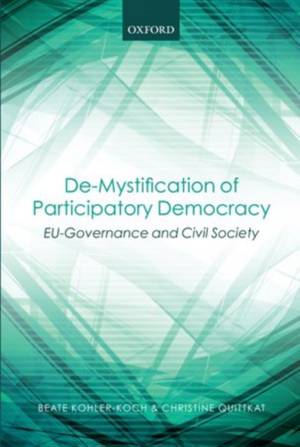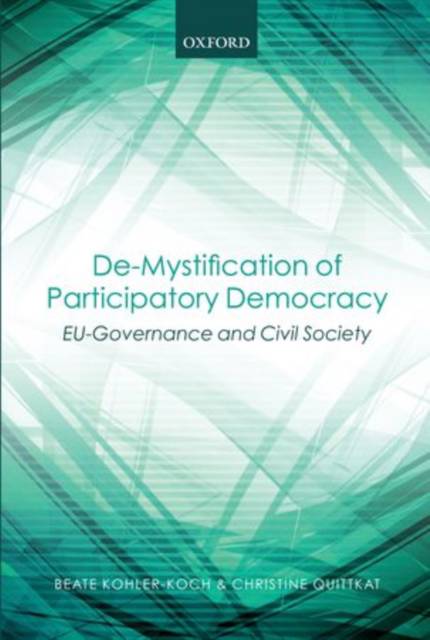
- Afhalen na 1 uur in een winkel met voorraad
- Gratis thuislevering in België vanaf € 30
- Ruim aanbod met 7 miljoen producten
- Afhalen na 1 uur in een winkel met voorraad
- Gratis thuislevering in België vanaf € 30
- Ruim aanbod met 7 miljoen producten
Zoeken
De-Mystification of Participatory Democracy
Eu-Governance and Civil Society
Beate Kohler-Koch, Christine Quittkat
Hardcover | Engels
€ 187,45
+ 374 punten
Omschrijving
The democratic legitimacy of the European Union has become an increasingly urgent issue. In searching for a way out, academics, EU institutions, and political forces advocate the involvement of civil society. The Commission's new governance approach and the Lisbon Treaty introduced elements of participatory democracy and elevated civil society to a key actor in democratizing the EU. Does this hold upon closer scrutiny? This is the main question of the book. It investigates how the promise of civil society participation is put into practice and, based on an elaborate theoretical framework, evaluates whether the political practice deserves the quality attribute 'participatory democracy'. The book presents the results of a large research project composed of several highly original empirical studies. The research team used various methodological approaches and generated a rich data set. The wealth of empirical insight is evaluated against clear criteria deduced from normative
democratic theory. As key elements of the analyses - democracy, participation, and civil society - are contested concepts, the authors placed particular emphasize on clarifying their understanding of these concepts and on considering competing interpretations. By relying on a consistent theoretical approach the authors present an unusually balanced evaluation. They come to convincing, though rather skeptical conclusions. Civil society participation in EU governance is not the democratic remedy its advocates had hoped for. This may not be a welcome but nevertheless it is an important finding both for European decision-makers, for civil society organizations and for scholars.
democratic theory. As key elements of the analyses - democracy, participation, and civil society - are contested concepts, the authors placed particular emphasize on clarifying their understanding of these concepts and on considering competing interpretations. By relying on a consistent theoretical approach the authors present an unusually balanced evaluation. They come to convincing, though rather skeptical conclusions. Civil society participation in EU governance is not the democratic remedy its advocates had hoped for. This may not be a welcome but nevertheless it is an important finding both for European decision-makers, for civil society organizations and for scholars.
Specificaties
Betrokkenen
- Auteur(s):
- Uitgeverij:
Inhoud
- Aantal bladzijden:
- 240
- Taal:
- Engels
Eigenschappen
- Productcode (EAN):
- 9780199674596
- Verschijningsdatum:
- 15/09/2013
- Uitvoering:
- Hardcover
- Formaat:
- Genaaid
- Afmetingen:
- 236 mm x 163 mm
- Gewicht:
- 513 g

Alleen bij Standaard Boekhandel
+ 374 punten op je klantenkaart van Standaard Boekhandel
Beoordelingen
We publiceren alleen reviews die voldoen aan de voorwaarden voor reviews. Bekijk onze voorwaarden voor reviews.











